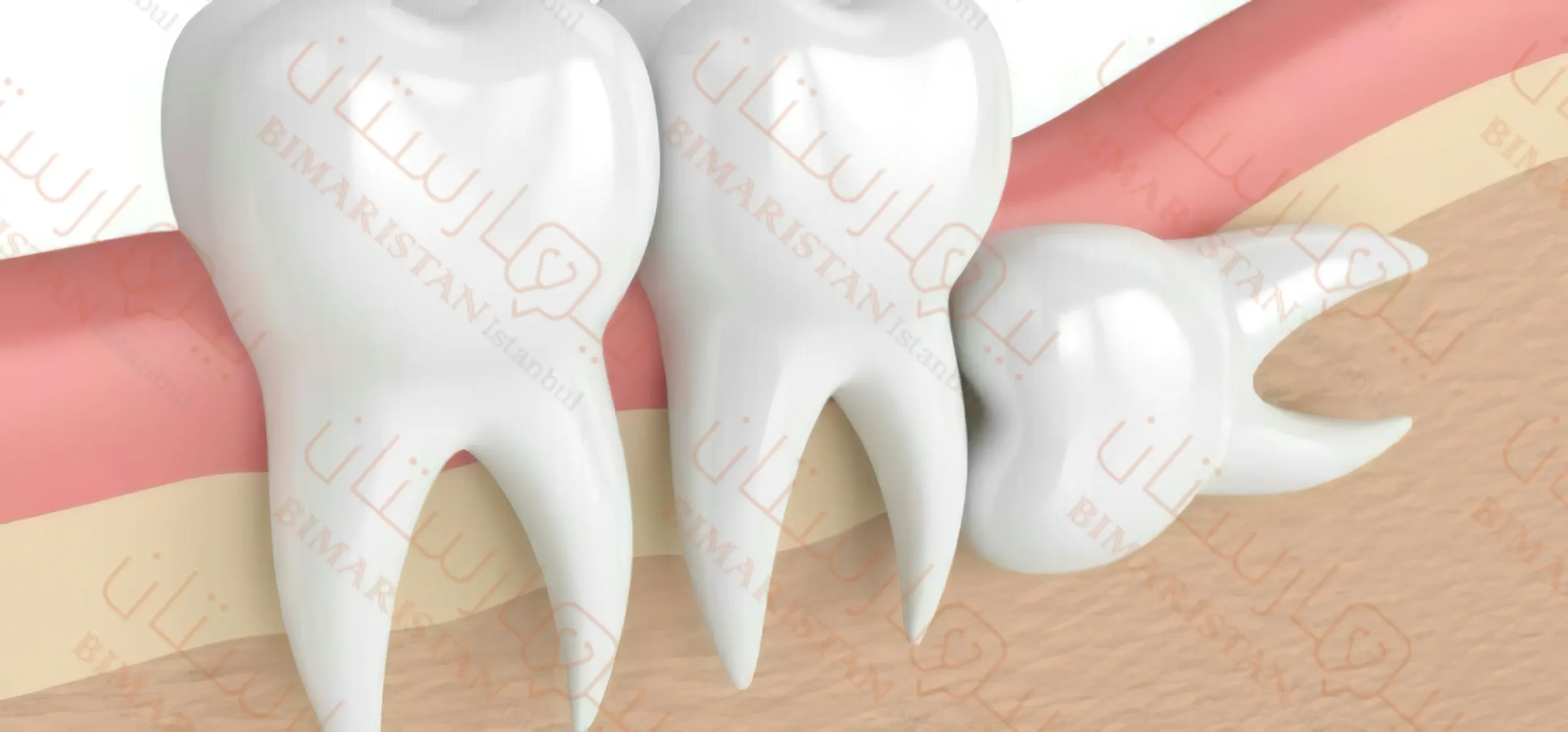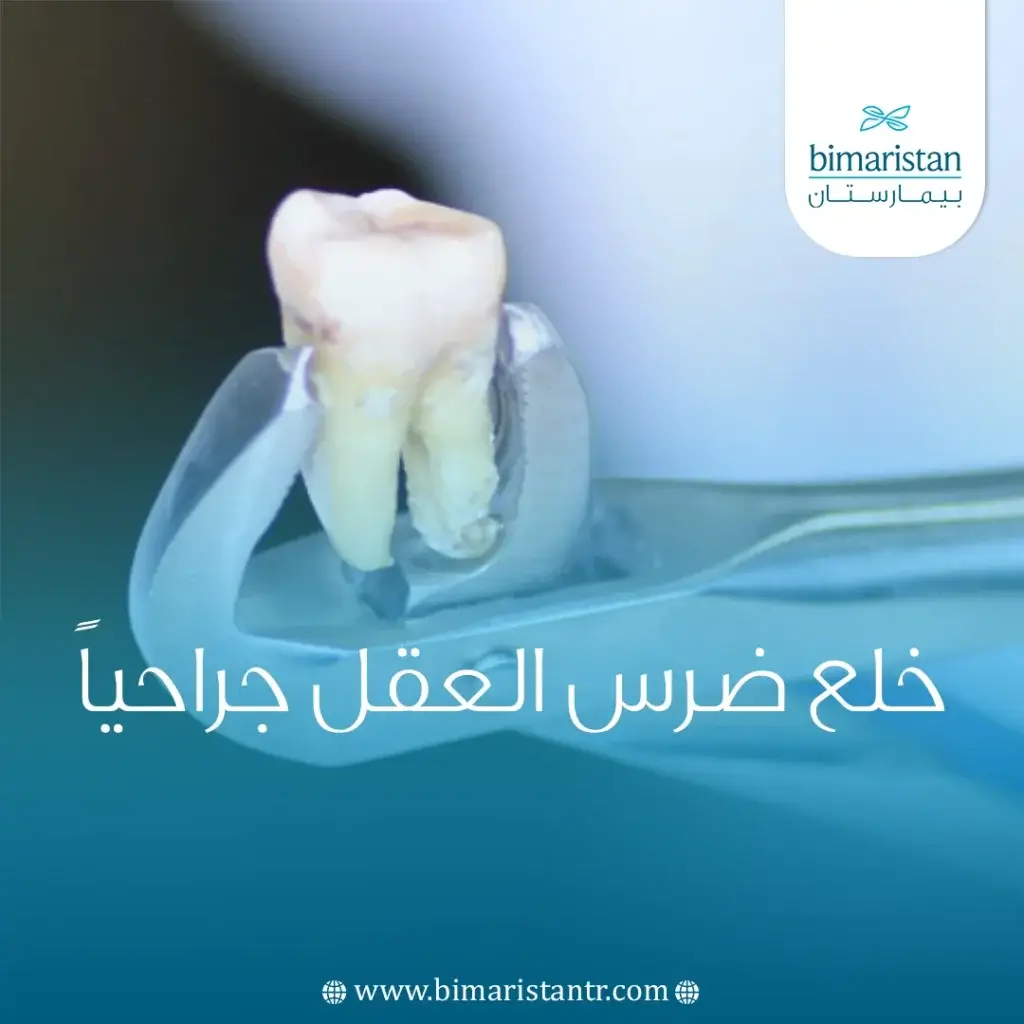خلع ضرس العقل يعد ممارسة شائعة وكثيراً ما تكون ضرورية لحماية الأسنان والعظم من الضرر، سنتعرف في المقال على استطبابات وتفاصيل عملية خلع ضرس العقل في تركيا.
يعد خلع أضراس العقل (أو الأضراس الثالثة) من أكثر العمليات الجراحية التي يتم إجراؤها عند جراح الأسنان، تنمو ضروس العقل في الجزء الخلفي من اللثة وهي آخر الأسنان بزوغاً ويمتلك معظم الناس 4 أضراس عقل 1 في كل زاوية.
يظهر ضرس العقل عادة عبر اللثة في أواخر فترة المراهقة أو أوائل العشرينات، تكون عادة الأسنان البالغ عددها 28 سناً قد أخذت مكانها في الفك مسبقاً ولا تبقى أحياناً مساحة كافية في الفم لتنمو أضراس العقل بشكل صحيح فتبرز ضروس العقل بزاوية خاطئة أو تبزغ بشكل جزئي فقط، نسمي ضروس العقل في هذه الحالات بالأضراس المنطمرة أو ضرس العقل المدفون.

متى يصبح خلع ضرس العقل ضرورة؟
عندما يسبب مشاكل أو تظهر الأشعة السينية أنه قد لايبزغ عندها يستطب خلع ضروس العقل، بالإضافة إلى أسباب أخرى:
- عندا تسبب ضرراَ للأسنان المجاورة: يمكن لضرس العقل ذو التوضع الخاطئ أن يدفع الأسنان الأخرى حوله مما يسبب ألماً في الفم ومشاكل في المضغ.
- تضرر الفك: يمكن أن تتكون الأكياس حول الأسنان التي لم تبزغ إذا لم يتم علاجها فيمكنها أن تثقب عظم الفك وتؤذي الأعصاب.
- مشاكل الجيوب الأنفية: يمكن أن تؤدي مشاكل ضرس العقل إلى ألم الجيوب الأنفية والضغط عليها وإحتقانها.
- التهاب اللثة: يمكن أن تنتفخ الأنسجة حول المنطقة فيصعب تنظيفها وتلتهب اللثة.
- النخور: يمكن أن تخلق اللثة المتورمة جيوباً بين الأسنان تساعد على نمو البكتيريا وتكوين النخور.
- الإرتصاف: يمكن أن يسبب ضرس العقل المنطمر مشاكل ازدحام الأسنان الأخرى فيصبح علاج تقويم الأسنان أمراً ضرورياً.

سيفحص طبيب أسنانك شكل فمك ووضعية أسنانك لاتخاذ قرار خلع ضرس العقل مع أخذ العمر بعين الإعتبار.
في حال كنت غير مستعد لخلع ضرس العقل الخاص بك يمكنك أن تطلب من طبيب أسنانك أن يشرح لك الخيارات المتاحة ففي كثير من الحالات يمكنك الانتظار عدة أشهر لمعرفة ما إذا كانت الأمور ستتغير قبل اتخاذ القرار ولكن إذا كنت تعاني من ألم أو لاحظت تورماً أو رائحة كريهة بالقرب من أسنانك الخلفية فقد يكون الوقت قد حان لأخذ احتمال خلع السن بعين الاعتبار.
ما يمكن أن تتوقعه أثناء الإجراء الجراحي
التخدير
قد يستخدم طبيب الأسنان أو جراح الفم أحد أنواع التخدير الثلاثة اعتماداً على مدى التعقيد المتوقع لخلع ضرس العقل ومستوى راحتك، تشمل الخيارات:
التخدير الموضعي
يقوم طبيب الأسنان أو جراح الفم بإدارة التخدير الموضعي بحقنة واحدة أو أكثر بالقرب من موقع القلع قبل أن تتلقى الحقنة، من المرجح أن يقوم طبيب الأسنان أو الجراح بوضع مادة على لثتك لتخديرها، أنت مستيقظ أثناء قلع السن لن تشعر بالألم ولكن ستشعر ببعض الضغط والحركة فقط.
التخدير المهدئ
يعطيك طبيب الأسنان أو جراح الفم تخديراً مهدئاً من خلال الوريد IV في ذراعك، يثبط التخدير المهدئ وعيك أثناء العملية ولن تشعر بأي ألم وستكون ذاكرة هذا الإجراء محدودة، ستتلقى أيضاً تخديراً موضعياً لتخدير اللثة.
التخدير العام
في حالات خاصة قد يتم إعطاؤك تخديراً عاماً حيث تستنشق الدواء من أنفك أو عن طريق الوريد في ذراعك أو كليهما ثم تفقد وعيك، لن تشعر بأي ألم ولن تتذكر العملية، يتم إعطاء التخدير الموضعي أيضاً للشعور بالراحة بعد الجراحة.
الخلع
أثناء خلع ضرس العقل جراحيا، يقوم طبيب الأسنان أو جراح الفم بما يلي:
- عمل شق في أنسجة اللثة لكشف الأسنان والعظام
- يزيل العظم الذي يمنع الوصول إلى جذر السن
- يقسم السن إلى أقسام إذا كان من الأسهل إزالته بشكل قطع
- يقلع السن
- ينظف موقع السن المقلوع من أي بقايا من الأسنان أو العظام
- يغلق الجرح بغرز لتعزيز الشفاء، على الرغم من أن هذا ليس ضرورياً دائماً
- يضع شاشاً على موقع الخلع للسيطرة على النزيف وللمساعدة في تكوين جلطة دموية

بعد عملية خلع ضرس العقل
إذا تلقيت تخديراً مهدئاً أو تخديراً عاماً، فسيتم نقلك إلى غرفة الإنعاش بعد العملية أما إذا كان تخديرك موضعي فمن المحتمل أن تكون فترة النقاهة القصيرة على كرسي الأسنان.
أثناء التعافي من الجراحة، اتبع تعليمات طبيب أسنانك بشأن:
النزيف
قد يحدث نزيف الدم في اليوم الأول بعد خلع الضرس، حاول تجنب البصق المفرط حتى لا تزيل الجلطة الدموية من التجويف واستبدل الشاش فوق موقع الخلع حسب توجيهات طبيب الأسنان أو جراح الفم حصراً.
إدارة الألم
قد تتمكن من تخفيف الألم إما باستخدام مسكنات الألم التي لا تستلزم وصفة طبية مثل الأسيتامينوفين أو بوصفة طبية من طبيب الأسنان أو جراح الفم، قد تكون مسكنات الألم الموصوفة طبياً مفيدة بشكل خاص إذا تم تجريف العظم أثناء العملية، قد يؤدي وضع الكمادات الباردة على الفك أيضاً إلى تخفيف الألم.
التورم والكدمات
الصدمة الموضعية الناتجة عن خلع ضرس العقل قد تسبب بعض التورم، استخدم كيس ثلج حسب توجيهات طبيب الأسنان أو الجراح، عادة ما يتحسن أي تورم في الخدين في غضون يومين أو ثلاثة أيام بينما يستغرق حل الكدمات عدة أيام أخرى، إذا حدث التورم بسبب انحشار قطع الطعام في منطقة الخلع اشطف الفم بالماء المالح أو بمضمضة فموية بعد 24 ساعة من جراحة خلع ضرس العقل.
ممارسة النشاطات
بعد الجراحة خطط للراحة لبقية اليوم واستأنف الأنشطة العادية في اليوم التالي، ولكن لمدة أسبوع على الأقل تجنب الأنشطة الشاقة التي قد تؤدي إلى فقدان الجلطة الدموية من تجويف السنخ مكان القلع.
المشروبات
اشرب الكثير من الماء بعد الجراحة ولا تشرب المشروبات الكحولية أو المحتوية على الكافئين أو الغازية أو الساخنة خلال الـ 24 ساعة الأولى، لا تشرب بالمصاصة لمدة أسبوع على الأقل لأن عملية المص يمكن أن تزيل الجلطة الدموية من التجويف.
الطعام
تناول الأطعمة اللينة فقط مثل الزبادي أو عصير التفاح خلال الـ 24 ساعة الأولى، ابدأ بتناول الأطعمة شبه اللينة عندما يمكنك تحملها وتجنب الأطعمة الصلبة أو التي تحتاج للمضغ أو الساخنة أو الحارة التي قد تعلق في التجويف أو تهيج الجرح.
تنظيف الفم
لا تغسل أسنانك بالفرشاة أو تشطف فمك أو تبصق أو تستخدم غسول الفم خلال الـ 24 ساعة الأولى بعد الجراحة، سيُطلب منك عادةً استئناف تنظيف أسنانك بالفرشاة بعد مرور الـ 24 ساعة الأولى، كن لطيفاً بشكل خاص بالقرب من مكان الجرح عند غسل الأسنان بالفرشاة واشطف فمك برفق بالماء الدافئ والملح كل ساعتين وبعد الوجبات لمدة أسبوع.
تعاطي التبغ
إذا كنت تدخن فلا تفعل ذلك لمدة 72 ساعة على الأقل بعد الجراحة وانتظر لفترة أطول من ذلك إن أمكن، إذا كنت تمضغ التبغ فلا تستخدمه لمدة أسبوع على الأقل، يمكن أن يؤدي استخدام منتجات التبغ بعد جراحة الفم إلى تأخير الشفاء وزيادة خطر حدوث المضاعفات.
غرز
قد يتم وضع غرز تتحلل في غضون أسابيع قليلة أو لايتم وضع غرز على الإطلاق، إذا تم وضع الغرز التي تحتاج لإزالة فحدد موعداً لنزعها.
متى تتصل بطبيب الأسنان أو الجراح
اتصل بطبيب الأسنان أو جراح الفم إذا واجهت أياً من العلامات أو الأعراض التالية التي قد تشير إلى وجود عدوى أو تلف في الأعصاب أو أي مضاعفات خطيرة أخرى:
- صعوبة في البلع أو التنفس
- نزيف شديد
- حمى
- الآلام الشديدة التي لا يمكن تسكينها عن طريق الأدوية الموصوفة للألم
- تورم يزداد سوءاً بعد يومين أو ثلاثة أيام
- طعم سيئ في فمك لا يزول بالمضمضة بالماء المالح
- صديد (قيح) في التجويف أو ناز منه
- خدر مستمر أو فقدان الإحساس الذي قد يكون سببه رض إحدى الأعصاب
- دم أو صديد في إفرازات الأنف
يعتمد طول الفترة التي يستغرقها خلع ضرس العقل على وضع السن وصعوبة الجراحة.
التعافي بعد الجراحة
يحدث التعافي من جراحة خلع ضرس العقل تدريجياً قد يستغرق الأمر أسبوعين حتى يتعافى الشخص تماماً ولكن يجب أن تتم ملاحظة بعض التحسن بين يوم وآخر، يمكن أن تساعد العناية بالجرح بشكل صحيح على التئامه في أسرع وقت ممكن.
في حال احتاجت الحالة إلى الخياطة للمساعدة في إغلاق الجرح سيقوم جراح الأسنان عادة بإزالة الغرز بعد حوالي أسبوع.
في بعض الأحيان تسبب الجراحة كدمات وتورم وألم الأمر الذي يتطلب أيضاً وقتاً للشفاء، قد يعاني المريض أيضاً من:
- ضيق الفك أو تحدد فتحة الفم
- دوار أو دوخان بسبب التخدير
نصائح التعافي من خلع ضرس العقل
قد تساعد النصائح التالية الشخص على الشعور بالتحسن بعد جراحة خلع ضرس العقل:
- إذا كان الشخص تحت التخدير أو خضع للتخدير العام فقد يشعر بالغثيان أو يعاني من القيء، قد يساعد تناول الدواء مع الطعام في تخفيف ذلك
- يجب على الشخص أن يستهلك الطعام بقدر ما يمكنه تحمله
- قد تسبب مسكنات الألم الموصوفة الغثيان في بعض الحالات، ناقش الآثار الجانبية للأدوية مع الطبيب.
- اتصل بعيادة الأسنان إذا استمر الغثيان أو القيء
تختلف فترة التعافي من شخص لآخر إذا تمت إزالة الخثرة الدموية من الجرح أو أصيب الجرح بالعدوى فقد يستغرق التعافي وقتاً أطول.

الجدول الزمني للتعافي
- أول 24 ساعة تتكون خثرات الدم
- بعد 2-3 أيام يتراجع انتباج الفم والخدين
- بعد 7 أيام يجوز لطبيب الأسنان إزالة أي غرز متبقية
- بعد 7-10 أيام يجب أن يزول تيبس وألم الفك
- بعد أسبوعين يجب أن تلتئم أي كدمات خفيفة على الوجه
العودة إلى الأنشطة اليومية بعد خلع ضرس العقل
يختلف وقت الشفاء من شخص لآخر ولكن الكثير من الناس يستطيعون العودة إلى العمل بعد يومين إلى ثلاثة أيام من خلع ضرس العقل وقد تحتاج لوقت أكثر في حال كان عملك شاقاً.
يجب تجنب أي نشاط مرهق لمدة 2 إلى 3 أيام بعد هذا الوقت يمكن للشخص أن يبدأ تدريجياً في استئناف الأنشطة العادية.
تسريع الشفاء عد خلع ضرس العقل
تتشكل خثرات الدم في مكان السن المخلوع، تعتبر جلطات الدم جزءاً أساسياً من عملية الشفاء لأنها:
- تساعد في منع النزيف الشديد
- حماية الجرح من العدوى
- تسمح للأنسجة الجديدة بالنمو
- حماية العظم المكشوف
من المهم بشكل خاص عدم إزالة هذه الجلطات الدموية في الـ 24 ساعة الأولى بعد الخلع وذلك عن طريق تجنب:
- مضمضة الفم
- شرب المشروبات الساخنة
- تناول الطعام الذي يتطلب المضغ
- المص من القشة
- التدخين أو شرب الكحول
من الجيد أيضاً شطف الفم برفق باستخدام مطهر الفم بعد 24 ساعة.
ماذا يمكن أن يفعل الشخص بعد الجراحة مباشرة؟
- قد تشمل النصائح العض على ضمادة في منطقة الخلع لمدة تصل إلى 60 دقيقة.
- قد يقترح طبيب الأسنان أو الجراح أيضاً استخدام كيس ثلج في الساعات القليلة الأولى بعد الجراحة.
- سيساعد وضع كيس ثلج على الجزء الخارجي من الوجه فوق منطقة الخلع لمدة 15 دقيقة وإزالته لمدة 15 دقيقة بشكل متكررعلى تقليل الانزعاج والتورم.
- إذا خضع المريض للتخدير العام فيجنب تجنب القيادة لمدة 48 ساعة مع أخذ يوم أو يومين إجازة من العمل أو المدرسة بعد الجراحة.
- يمكن تناول مسكنات الألم بحسب توجيهات الطبيب للمساعدة في تخفيف شعور الألم وعدم الراحة بعد جراحة خلع ضرس العقل.
المضاعفات المحتملة بعد خلع ضرس العقل
في بعض الأحيان قد يصاب الشخص بعدوى ويحتاج لمضادات حيوية، تشمل أعراض الإصابة ما يلي:
- ألم
- تورم
- قيح أصفر أو أبيض حول الجرح
- ارتفاع درجة الحرارة
هناك خطر ضئيل للإصابة بحالة تسمى التهاب السنخ الجاف بعد جراحة خلع ضرس العقل، يمكن أن يحدث هذا إذا لم تتشكل جلطة دموية أو أزيلت من الجرح، يسبب السنخ الجاف ألماً شديداً ونابضاً سيحتاج المريض لزيارة طبيب الأسنان لتغطية الجرح بضماد.
عند خلع ضرس العقل مع الانتباه للرعاية اللاحقة المناسبة فإن احتمال حدوث المضاعفات يكون ضئيلاً، إذا كان الشخص يعاني من ألم شديد أو نزيف شديد أو حمى أو أي أعراض أخرى غير متوقعة فعليه زيارة طبيب الأسنان.
نصائح العناية بالمنزل بعد الجراحة
من الضروري الحفاظ على الجرح نظيفاً أثناء الشفاء والانتباه أثناء تناول الطعام من انحشار أي بقايا طعامية في منطقة الخلع.
هنا بعض النصائح للمساعدة في الحفاظ على الجرح نظيفاً:
- استخدم غسول الفم المطهر بعد 24 ساعة من الخلع لمنع العدوى
- اشطف بالماء الدافئ والملح لتقليل التورم وتسكين التهاب اللثة بعد مرور 24 ساعة
- رفع الرأس عند النوم للشعور براحة أكبر
بالإضافة إلى الألم قد يشعر بعض الأشخاص بالتعب بعد خلع أسنانهم وقد يختارون تجنب ممارسة الرياضة لبضعة أيام بعد الجراحة.
ماذا يأكل الشخص بعد خلع ضرس العقل؟
يمكن أن يساعد تناول الأطعمة اللينة أو السائلة في منع تضرر الجروح، على سبيل المثال:
- الجيلاتين
- المعكرونة الناعمة
- موز مهروس
- حساء رقيق
في الأيام القليلة الأولى بعد الجراحة تجنب الأطعمة التي تحتاج إلى مضغ مثل الحلوى اللزجة أو العلكة، قد تنحشر هذه الأشياء وتسبب الألم وعرقلة التثام الجرح، تجنب أيضاً الأطعمة القاسية والمقرمشة مثل الرقائق والمعجنات والمكسرات والبذور بالإضافة إلى الأطعمة الساخنة أو الحارة.
إذا تمت إزالة ضرس أو ضرسين من أضراس العقل من نفس الجانب من الفم فقد يكون من الممكن المضغ على الجانب الآخر من الفم بعد 24 ساعة.
المصادر
